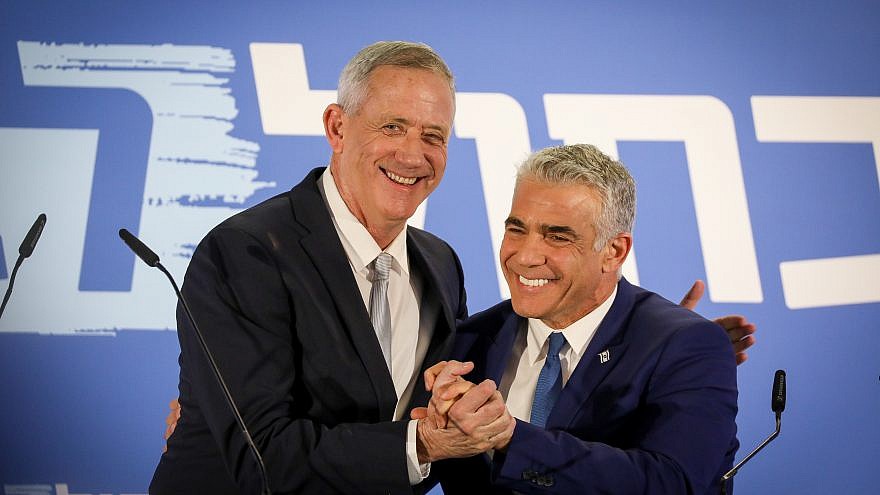The leaders of the new Blue and White Party–Benny Gantz and Yair Lapid—held their first political rally on Thursday night after the two candidates shook up the Israeli political scene earlier in the day.
In a joint appearance, the two men sought to promote themselves as centrist politicians seeking unite the country after nearly a decade of under the right-wing leadership of Israeli Prime Minister Benjamin Netanyahu.
In his remarks, Lapid said that he believes in the leadership of Gantz, who would take the reins as prime minister for the first two-and-a-half years if the party if he able to secure a governing coalition. Lapid would initially serve as foreign minister, then take over as prime minister, according to the agreement forged by the two party leaders earlier on Thursday.
“I wouldn’t be standing here today if I didn’t believe that Benny Gantz could lead us to victory and then lead the country. He’ll be an excellent prime minister. I believe in him,” said Lapid.
The two were joined on stage by former Defense Minister Moshe Ya’alon and by former Israel Defense Forces’ chief of staff Gabi Ashkenazi, who joined the party on Thursday in the No. 4 position behind Ya’alon, giving the new political party formidable security credentials up top.
“I believe we can complete our mission and I have no doubt we will succeed,” said Ashkenazi.
A history of generals at the helm
Meanwhile, Netanyahu touted his own record protecting Israel in the last decade during a rally on Thursday night. Netanyahu derided the Gantz and Lapid as being leftists, despite their centrist appeal.
“We may have a left-wing, Lapid-Gantz government relying on Arab parties. A government like this will destroy our economy. Sooner or later, probably sooner, they will establish a Palestinian state … that will endanger our existence,” he warned voters.

Netanyahu also noted that Israel has had former generals as leaders, which he said led to more terrorism.
“We have been in this picture twice before with generals on the Left who dress up as Right and talk about unity, but want left-wing policies,” Netanyahu said, referring to former prime ministers Yitzhak Rabin and Ehud Barack, who both led the left-wing Labor Party.
“In 1992, we got [Yitzhak] Rabin and the Oslo disaster, and in 1999, we got [Ehud] Barak and the intifada with exploding buses and over 1,000 killed.”
“When I’m prime minister, you’re not afraid to get on a bus or enter a restaurant,” he added.
Too early to make predictions
Emily Landau, a senior research fellow at the Institute for National Security Studies (INSS), told JNS that it is too early to tell how the new Gantz-Lapid team will shape up on security issues.
“The new party certainly has candidates with strong security credentials, but some would argue that there are too many generals, especially now that [former IDF chief of staff Gabi] Ashkenazi has been added,” she said. “Even regarding the two women in the first 10 places, one of them is also a general.”
“What unites them most is the fact that they have a realistic chance of providing an alternative to Netanyahu, a goal that seems to have significant resonance in the Israeli public at this point,” said Landau.
“Voters are probably more focused on this than on specific positions, although Gantz has been working hard to appeal to a wide audience, to the point that he is ‘accused’ by different sectors as being both right and left and middle … ”
In polling released on Thursday, the new Blue and White Party seemed to have a strong initial impact on voters.
According to a poll from Israel’s Channel 12, the Blue and White Party would gain 36 seats, while Likud would win 30. Another poll by Israel’s Channel 13 found a similar total for Blue and White, while Likud would only manage to gain 26 seats.
Yossi Klein Halevi, an American-born Israeli author and journalist, told JNS that the new Gantz-Lapid party shows that the only feasible challenge to the Israeli right-wing bloc headed by Netanyahu can come from the center.
“The Israeli political map is no longer defined, as many American Jews still think it is, by the left-right divide. The new divide is center-right,” he said.
As such, Halevi noted that several key distinctions differentiate the new Israeli center from the Israeli right.
“The center shares with the right the deep conviction that all of the land between the river and the sea is ours. But unlike the right, the center is prepared under certain circumstances to compromise,” he said. “Again like the right, the center basically agrees that there is no chance anytime soon of solving the conflict. But unlike the conflict, the center believes that Israeli policy should be laying the foundation for a long-term solution that would include withdrawal from much of the territory.”
Nevertheless, Netanyahu made it clear that choosing to vote for Gantz and Lapid would be supporting a left-wing government.
“Tonight the decision is as clear as it ever was: a new left-wing government, weak, led by Lapid and Gantz, with a blocking majority of Arab parties, or a strong right-wing government presided over by me,” he said.


























